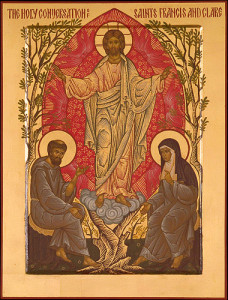|
|
Posted By Teresa Redder, on November 4th, 2025 A Reflection for All Saints’/All Souls’ Day
by Sister Mercedes Rojo, OSF
In Spain and all Latin American countries this is a very special celebration. It is a time when we remember and honor our family members who had passed on. On this feast, I take time looking at photos of my parents, my brothers, aunts and uncles who have passed on. I take time to remember moments of joy as well as hard moments…. I take time to be with each one… talk to them about those moments… ask them how they think about what we can learn from their new vision of those events.
I believe that they will tell us about the importance of seeing life with a new light. And invite us to be attentive to the daily GRACE we receive. Why? Because we are on a journey. A journey of grace. And if we allow it, we can receive the grace of a NEW HEART. Remember Ezekiel’s promise: “ I will give you a new heart and a new spirit. I will remove from you your heart of stone and give you a heart of flesh.” (Ezekiel 36:26). It is good to notice that Ezekiel does not say it is a replacement…. This promise is about my own heart now, a heart transformed by God’s grace: a heart softer, more compassionate, welcoming to all, and more receptive to God’s movement within me, and willing to grow. Yes, a new heart transformed by God’s grace.
Let us this month remember the “saints” in our families, remember the blessings we received from them, and ask them to intercede to God for us, so that we will continue to be open to God’s presence in our lives, to be attentive to God’s “nudges” and “challenges” and be courageous to answer with fidelity knowing that God is walking this journey with us.
Sr. Mercedes Rojo, OSF, is the Spiritual Assistant of St. Francis Fraternity (Folsom, PA)
Posted By Teresa Redder, on October 6th, 2025 Reflection by Sister Mercedes Rojo, OSF (Spiritual Assistant of St. Francis Fraternity, Milmont Park, PA)
My dear Friends,
Happy Feast of St. Francis!!!
As I wrote this reflection, the trees are shedding their leaves in a magnificent song of joyful surrender. This is what St. Francis practiced so well all his life!! So yesterday, I prayed for all of you that, like him, we may learn to let go of what no longer serves us trusting our loving God to fill those spaces with the gifts of freedom, peace, and full trust in God’s Abundant Grace!
Blessings,
Mercedes
October 4, 2025 – The Feast of St. Francis of Assisi
My Dear Friends,
Last month I reflected on the daily surprises that life brings us daily. As I write to you, we have already arrived at the fall equinox, this magical time when the world around us naturally shifts into equilibrium. Day and night stand in perfect harmony, reminding us of the Beauty and Gift of BALANCE.
What a wonderful opportunity to take time for reflection and renewal — a chance to examine whether or not there is balance in our life, to reflect on what no longer serves us … letting it go, and making SPACE for GOD’S GIFT OF GRACE – the HARVEST of the many gifts received!
Just as night and day move into balance, and trees move into surrender mode releasing their leaves, we too can embrace this time as an opportunity to simplify, realign, and balance. To give thanks for the many graces that have brought us to this point, and then, in deep trust, to let go and ALLOW GOD’S GRACE to do the work that is still needed in us.
What keeps me in balance and aligned with God’s wisdom and grace?
What helps me live each day more open, attuned to God’s voice, and at peace?
What helps me see what no longer serves me and let go?
Letting go is hard!!! Yes, it is, but let us remember that Autumn is also HARVEST time! When wheat and grapes ARE RIPE ENOUGH TO FEED US!!
Autumn: so many fruits top harvest, so many surprises to explore within and around us. Think of the gifts received throughout spring’s growth and summer rest. How can we cultivate them and allow to grow in strength within us? What daily practices can help us do this?
This month we celebrate the feast of St. Francis of Assisi, a man so in touch with God’s presence in all creation. His life his personal transformation connects us to the lessons of the autumn season, emphasizing the importance of personal surrender and balance which leads to the beauty of transformation, and the call to embrace God’s presence in our HERE and NOW.
Francis valued and faithfully practiced letting go of the parts of himself that did not serve him any longer, and in the process, finding FREEDOM, PEACE AND FULL TRUST in GOD’S GRACE.
So what does Francis and Autumn teach us? As you look around, the leaves are letting the green go, but the beauty is not gone, only becomes stronger and deeper… transformed into multiples shades of fiery red and gold!!
Having taught photosynthesis to my students long ago, I asked myself, how do the trees live without their leaves? How do they find the food they need?
And the trees answered me: “We now FEED FROM WHAT WAS STORED INSIDE of us… what lives now INSIDE!!
Remember the words of Jesus… Every disciple to the Kingdom is like the householders, bringing forth OUT OF THEIR TREASURE things both new and old, Mt 13,
At the end of his life, Francis gathered his friends and told them: “I HAVE DONE WHAT IS WAS MINE TO DO. NOW, GO AND DO WHAT IS YOURS.”
SO, WHAT IS OURS TO DO? What is God asking of ME, NOW?
For myself, I want to look at the trees as I imagine Francis did when he lived in the beautiful Rieti Valley… … I want to watch how they surrender – not in sadness- but in a multicolor song of freedom and joy! And I want to be open to God’s grace to have that same freedom and joy!
I want to learn from them how to let go of what no longer serves me and in freedom and Joy follow God’s call to me NOW?
I want to learn how do I bring forth what’s inside me, unlocking the energy of the treasures I’ve been given? And then, to go and do what is mine to do!
One of the great messages of Autumn for me is that life is a continuous cycle of birth, growth, harvest, and letting go, and in the process learn from God’s amazing creation the natural flow and rhythm of birth, death and rebirth.
So let us take time to appreciate the abundance of what has been given by God’s GRACE, as well as the wisdom life has given us…
YES, THE FRUITS OF OUR HARVEST! AND — Give THANKS! ALLOW OUR LOVING AND GRACIOUS GOD to continue His work in us!!
Peace and All Good, Mercedes
Posted By Teresa Redder, on March 1st, 2024 Fr. Tom Betz, OFM Cap (Pastor of St. John the Evangelist Church-Philadelphia, PA) offered a Lenten retreat on Sunday, February 25th, with the theme of “Jesus of Nazareth.” In his reflection, Fr. Tom also spoke about the Stigmata of St. Francis. Bob McKee, an inquirer to the fraternity, presented perspectives on Jesus’ forgiveness from the Cross.
The fraternity shared some photos from this special day of reflection and conversion…
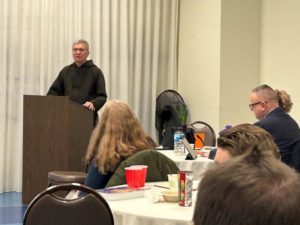 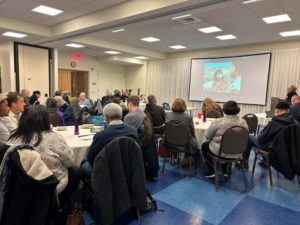 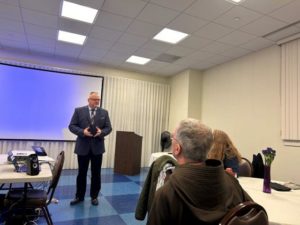 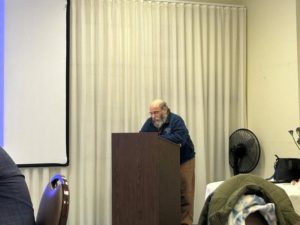 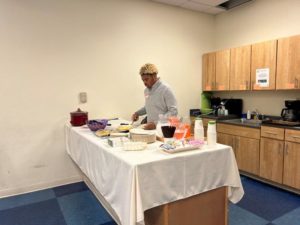 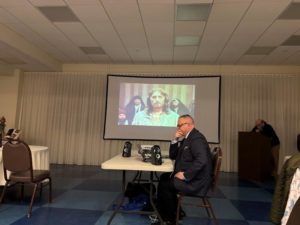
St. John the Evangelist Fraternity also shared links to two of the reflections:
https://drive.google.com/file/d/1vblJ-0Y0gnoKmVQkQvRaG2wO49vPUsad/view?usp=drive_link
https://drive.google.com/file/d/18dxmTuvd0pDA9qfO-MlNoJ0bYkbq-MNo/view?usp=drive_link
May our Lenten journey bring us closer to Christ through deep reflections such as these!
Posted By Kate Kleinert, on April 28th, 2022 Shared by our sister and Regional Vice Minister, Cindy Louden, OFS
April 28 – Blessed Luchesio (Lucius) & Buonadonna d. 1260
Luchesio Modestini was a merchant in the little town of Poggibonzi in Tuscany. More than most merchants, he was so entirely and solely concerned with material success that he was generally reputed to be an avaricious man. His wife, Buonadonna, was of a similar disposition. Then the grace of God touched the husband. He realized how foolish it is to strive only for worldly goods, of which he could take nothing with him to eternity, meanwhile forgetting about his soul’s salvation, as he had, unfortunately, been doing until then. He began to practice works of mercy and to perform his religious obligations with fidelity; he succeeded in winning his wife over to a similar outlook on life.
Since they had no one to care for but themselves, and Luchesio feared that in conducting his business he might relapse into covetousness, he gave up his business entirely. He and his good wife divided everything among the poor and retained for themselves only so much acreage as would suffice for their support. Luchesio tilled this with his own hands.
About this time St. Francis came to Tuscany. After his sermon on penance, hosts of people desired to leave all and enter the convent. But the saint admonished them calmly to persevere in their vocation, for he had in mind soon to give them a special rule according to which they could serve God perfectly even in the world.
At Poggibonzi Francis visited Luchesio, with whom he had become acquainted through former business transactions. Francis greatly rejoiced to find this avaricious man so altered, and Luchesio, who had already heard about the blessed activities of Francis, asked for special instructions for himself and his wife, so that they might lead a life in the world that would be pleasing to God.
Francis then explained to them his plans for the establishment of an order for lay people; and Luchesio and Buonadonna asked to be received into it at once. Thus, according to tradition, they became the first members of the Order of Penance, which later came to be called the Third Order, (and then Secular Franciscan Order).
If Luchesio and Buonadonna were really the first Tertiaries, they must have become such not long after St. Francis founded his First Order in 1209. The first simple rule of life, which St. Francis gave to the first Tertiaries at that time, was supplanted in 1221 by one which Cardinal Ugolino prepared in legal wording. And in the same year Pope Honorius III approved this rule verbally. For this reason, the year 1221 (801 years ago) is often given as the date of the founding of the Third Order of St. Francis/OFS.
After Luchesio had put on the gray garment of a Tertiary,(this is still permitted at our death) he rapidly advanced toward perfect holiness. He practiced penitential austerities, often fasted on bread and water, slept on the hard floor, and at his work bore God constantly in his heart. His generosity to the poor knew no bounds, so that one day there was not even a loaf of bread for his own household. When still another poor man came, he asked his wife to look whether there was not something they could find for him. That vexed her and she scolded him severely; his mortifications, she said, had well nigh crazed him, he would keep giving so long that they themselves would have to suffer hunger. Luchesio asked her gently to please look in the pantry, for he trusted in Him who had multiplied a few loaves for the benefit of thousands. She did so, and the marvel of it! The whole pantry was filled with the best kind of bread. From that time on Buonadonna vied with her husband in doing good.
When a plague raged in Poggibonzi and the surrounding places, Luchesio went out with his laden donkey, to bring the necessaries to the sick. When he did not have enough to supply all, he begged for more from others in behalf of the distressed.
Once he carried a sick cripple, whom he had found on the way, to his home on his shoulders. A frivolous young man met him, and asked him mockingly, “What poor devil is that you are carrying there on your back?” Luchesio replied calmly. “I am carrying my Lord Jesus Christ.” At once the young man’s face became distorted, he cried out fearfully, and was dumb. Contritely he cast himself on his knees before Luchesio, who restored his speech to him by means of the Sign of the Cross.
The time had come when the faithful servant of God was to receive the reward for his good works. When he lay very ill, and there was no hope for his recovery, his wife said to him, “Implore God, who gave us to each other as companions in life, to permit us also to die together.” Luchesio prayed as requested. and Buonadonna fell ill with a fever, from which she died even before her husband, after devoutly receiving the holy sacraments. Luchesio passed away with holy longing for God on April 28, 1260. At his grave in the Franciscan church at Poggibonzi many miracles have occurred. His continuous veneration as Blessed was approved by Pope Pius VI.
CONCERNING IMPERISHABLE TREASURES
1. Christ our Lord says in His Gospel: “The kingdom of heaven is like to a merchant seeking good pearls. Who when he had found one pearl of great price, went his way, and sold all that he had, and bought it” (Matt 13:45-46). Such a merchant was Blessed Luchesio, since, having been enlightened by grace, he found the costly pearl of true godliness. Then he desisted from his covetous chase after perishable goods, gave them up in order to inherit imperishable treasures, which now delight him in his beatitude with God, and will be his eternal joy. May we, too, find this costly pearl!
2. Consider what folly, on the other hand, it is to strive after temporal goods as is done by so many people. They place their body and soul in danger; they have troubles here on earth and hereafter. The body is exposed to fatigue, hardships, privations, and even danger to life; through falsehood and deceit, through disregard of the commandments of God and of the Church, the soul becomes laden with much guilt. And in the end, what does man achieve with the temporal goods he has acquired? “As he came forth naked from his mother’s womb, so shall he return, and shall take nothing away with him of his labor” (Eccl 5:14). Must the same judgment perhaps be passed concerning your endeavors?
3. Consider that not everybody in this world can act as did Blessed Luchesio. Not everyone is free of obligations toward others, who are perhaps entrusted to his temporal care, nor has everyone the grace and the vocation for such extraordinary virtues. If anyone believes himself called by God in that way, he should seek counsel with his spiritual director. But everyone can and should strive, while following his occupation and business, to gather at the same time eternal and imperishable goods. He can do that if he conducts his temporal business as the special vocation assigned to him by God to acquire a livelihood for himself and his family; if through it he endeavors to be of service to his fellowmen; if he tries to promote Christian morality according to the best of his power, himself setting the good example; if, finally, he does not endeavor greedily to hoard what he acquires, but uses it well, gladly sharing it with those in need. “Blessed is the rich man who is found without blemish; and who has not gone after gold, nor put his trust in money nor in treasures” (Eccl 31:8).
PRAYER OF THE CHURCH
O God, who in the plentitude of Thy mercy didst call Blessed Luchesio to penance and didst permit him to shine by the merits of piety and liberality, grant us at his intercession, that in imitation of his example, we may produce worthy fruits of penance, and through works of piety and charity merit forgiveness. Through Christ our Lord. Amen.
from THE FRANCISCAN BOOK OF SAINTS
edited by Marion Habig, OFM Copyright 1959, Franciscan Herald Press & used with written permission from the publisher
Posted By Kate Kleinert, on July 24th, 2021
Posted By Kate Kleinert, on July 21st, 2021
To answer this question, we need to look at the readings from the 17th Sunday in Ordinary Time (July 25, 2021). In both the first reading (2 Kings 4:42- 44) and the Gospel (John 6: 1-15) we have different people assessing a situation where there is a scarcity of resources. Although the numbers to be fed vary greatly – 100 in the first reading versus 5000 plus in the Gospel – the results come about strictly in relying on God’s abundance. This abundance creates leftovers but before we address that let us look at how each person tries to deal with this situation.
In the first reading the servant objects at Elisha’s instruction to give the twenty barley loaves and fresh grain in the ear to the people to eat. He responds, “How can I set this before a hundred people?” He makes a mathematical evaluation and sees the scarcity of resources. Elisha, the man of God, insists saying, “Give it to the people to eat. For thus says the Lord, ‘They shall eat and there shall be some left over.’” His faith and reliance are on God. The servant did as he was told and the reading ends with, “And they ate, and had some left, according to the word of the Lord.” (2 Kgs 4:44)
In the Gospel, Jesus sees a large crowd coming to Him. He asks Philip, “Where can we buy enough food for them to eat?” Philip seems to be overwhelmed by how much it would cost to meagerly feed the crowd. Another disciple, Andrew, finds a boy in the crowd who has five barley loaves and two fish but again just like the servant of the first reading he looks at the scarcity of resources and says, “but what good are these for so many?”
The responses and reactions we have read of so far begs to ask ourselves, how do we see the world? Do we only see the scarcity or the Divine abundance? Do we make God part of the solution? Do we pray?
“Jesus took the loaves, gave thanks, and distributed them.” They also had as much fish as they wanted. When they had their fill, Jesus told the disciples, “Gather the fragments left over, so that nothing will be wasted.”
The leftovers
Leftovers brought to memory the meals I would have with family, especially when my mom was alive, where I would not only be filled but I was sent home with leftovers. Do you know that some Italian dishes such as lasagna and eggplant parmesan are better the next day, when all the ingredients have had a chance to rest and form that perfect marriage between the pasta, cheeses, sauce and herbs.?
There were twelve baskets of leftovers in John’s Gospel, one for each of the twelve disciples. There are always leftovers when we get fed from God, especially at Mass. We have the Liturgy of the Word and the Eucharist. We are fed and leave the church filled by the Eucharist and we are to bring that excess to others we meet. Our sharing of what God has done in our lives with others is like sharing a piece of yesterday’s lasagna. It is all done out of God’s abundance and love for every one of us. Please do not waste the leftovers.
|
|



